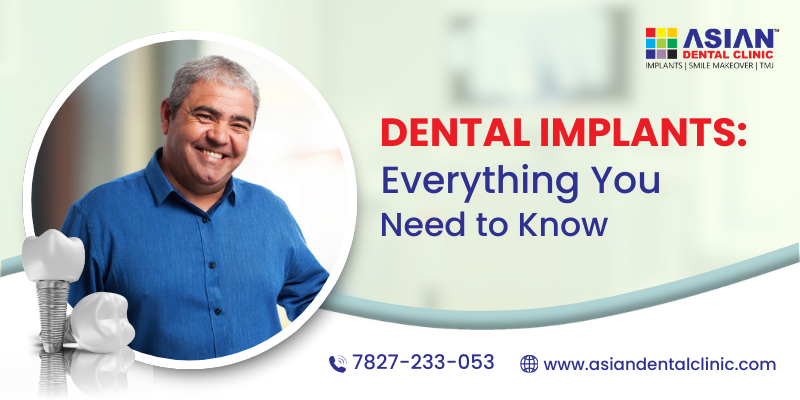Blog
- home
- Dental Implants: Everything You Need to Know
Dental Implants: Everything You Need to Know

Everyone needs a perfect solution for missing teeth, which may occur due to injury, decay, or other health issues. Dental implants have transformed the field of modern dentistry, offering a permanent solution for missing teeth. Dental implants provide an effective and aesthetically pleasing replacement option resembling natural teeth. Dental implants benefit people who have lost one or more teeth, individuals seeking a long-term alternative to dentures or bridges, and patients with sufficient bone density to support the implant.
What Are Dental Implants?
Dental implants are artificial teeth that mimic your natural tooth made up of titanium. They are inserted into the jawbone to provide a foundation for replacement teeth. A dental implant has three main components:
Implant: The screw-like post is inserted into the jawbone.
Abutment: It is a connector between an implant and a crown.
Crown: The visible, custom-made artificial tooth that mimics the natural tooth.
There are two main types of dental implants:
Endosteal Implants: Placed directly into the jawbone, they are the most commonly used type.
Subperiosteal Implants: These are typically placed on top of the jawbone. They are for patients with insufficient bone height.
Dental implants offer superior stability, longevity, and functionality compared to conventional tooth replacement options such as dentures and bridges. Unlike dentures, implants are fixed, do not require adhesives, and do not rely on adjacent teeth for support like bridges.
Benefits of Dental Implants
Dental implants offer numerous advantages, making them an excellent investment for long-term oral health. Some key benefits include:
Aesthetic Improvement: Implants blend with your natural teeth that are quite undifferentiable and improves the entire smile and facial structure.
Functionality and Comfort: It also aids in proper chewing of food making it easier to speak without discomfort.
Durability: Dental implants can last long, unlike dentures and bridges that may need replacement.
Preservation of Jawbone and Facial Structure: Implants prevent bone loss and maintain the natural facial contours.
Improved Speech and Eating Ability: Implants eliminate speech difficulties caused by missing teeth and provide the strength to enjoy various foods.
Who is a Good Candidate for Dental Implants?
Certain individuals may not qualify for dental implants. Several factors are considered to ensure the success of the procedure, such as:
Oral Health Requirements: A person with a healthy periodontium is ideal for dental implants.
Bone Density Considerations: In certain cases sufficient bone volume is absent. Hence, bone grafting may be necessary for those with insufficient bone.
Medical Conditions: Patients with diabetes or immune disorders may require more care than others, as such conditions can impact healing and implant success.
Age Restrictions: While there is no upper age limit, younger individuals whose jawbones are still developing may need to wait before getting implants.
Complications
Although dental implants have a high success rate, there are potential complications that need to be taken care of, such as:
Implant failure due to poor osseointegration and nerve damage leading to numbness. Choosing a qualified dental professional, following a post-surgical prognosis, and maintaining proper oral hygiene can help mitigate complications.
Persistent pain, swelling, or loosening of the implant are indicators that require immediate dental attention.
Recovery and Aftercare Tips
Appropriate post-procedure care is essential to maximize the lifespan and effectiveness of dental implants. Following these tips can ensure a smooth recovery and optimal implant performance:
Post-Surgery Care:
Your meal should have a soft diet in the beginning.
Maintain oral hygiene by gently cleaning around the implant.
Manage pain with prescribed medications and avoid strenuous activities.
Maintenance:
Routine dental care like brushing and flossing are essential to prevent complications.
Follow-Up Visits:
Regular visits allow the dentist to monitor the implant and ensure proper function and health.
Dental Implants Vs. Other Tooth Replacement Options
When deciding on a tooth replacement solution, it is essential to compare dental implants with alternatives like dentures and bridges:
Permanent solution with a natural look and feel.
It prevents bone loss and maintains facial structure.
Does not require modification of adjacent teeth.
Dental implants contribute significantly to overall dental well-being and function, providing a permanent solution for missing teeth. While the procedure requires careful consideration and financial commitment, the long-term benefits far outweigh the initial costs. If you are looking for dental implant treatment, consult an Asian dental clinic to determine if they are the right option. With adequate attention, dental implants can offer a lifetime of confident smiles and improved quality of life.

